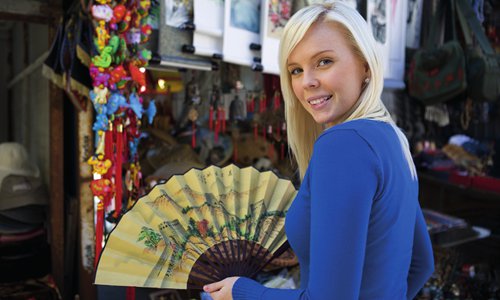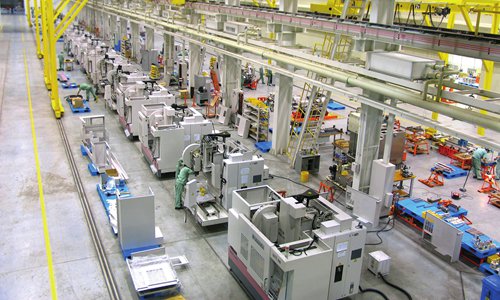
With the 40th anniversary of the reform and opening-up, expats and Chinese hope to dispel misconceptions about today's China. Photo: VCG
"I think China is a very poor country."
"Everyone there is rude."
"Don't they all eat cats and dogs?"
"I think the biggest differences are the ones I saw when I got to China," said Sherry Eberling, 56, who works at Nassco, a Navy shipyard in San Diego, California. Recently, Eberling spent a week in China visiting her daughter who has been living and working in Beijing for over two years.
"When I asked her if she wanted me to bring her anything, she told me she could get whatever she needed there at a cheaper price; I was surprised," Eberling said, adding that while China was much different than she imagined, she was happily surprised at how much infrastructure there was for transportation and payment.
"Everywhere we went, my daughter just whipped out her phone and paid for it, even at small food stands outside remote tourist attractions."
While China is continuously growing and developing, there are still many people outside of China that have no idea about the growth and modernization of the country. This year, China will celebrate its 40th anniversary of the opening-up and reform, and many expats and Chinese feel it is time to make sure that the picture of China is not only one created by Hollywood, but one that represents today's diverse and growing nation.
The Metropolitan spoke with expats and locals in China to find out some of the most common misconceptions they experience and what they wish they could clear up to people who have not experienced or researched China on their own.

Products that are made in China continue to climb in popularity. Photo: VCG

Many people believe that if you are living in China, you do not have access to Western music, movies or food. Photo: VCG
The stereotypes and misconceptions
"When I first came to China, I would laugh when my friends asked me how I could breathe or if I ate dog, but now it gets on my nerves," said Darian Knickson, 26, who has been living and working in China since he was 21.
"I think people have large misconceptions about Chinese people and their personalities," Knickson said.
"Since I have learned Chinese, I have made many close Chinese friends and they are just as fun and outgoing as my friends from any other part of the world," he said, adding that he believes many of the misconceptions about Chinese people from expats living in China are because of a lack of Chinese language skills or interest in getting to know another culture.
Chinese national Iris Xie, 23, a project coordinator born and raised in Beijing, says that there are stereotypes that she consistently hears from her non-Chinese friends as well. "In general, most non-Chinese people I meet still think China is a country living in poverty and underdeveloped. They think everywhere here is overpopulated and the people here are extremely conservative," she said.
In addition to the misunderstandings, Xie says that the lack of knowledge Westerners have of the East has also changed her perception of them.
"In the past, I thought Westerners were open minded, well educated and full of knowledge about the world. I gradually realized that though they do live a very high-quality life, many of them severely lack knowledge about the Eastern world," she said.
"For example, when I was in Bristol, UK, a British friend asked me if we have dishwashers, Nutella or mustard in China, which makes me feel that in their minds we don't have access to technology and resources," she said, adding that another one of her friends thought that every Chinese family had a panda as a pet.
A similar situation also occurred with Emma Piper (pseudonym), a 25-year-old from London who lives and works in China, when she was back home. "My sister says, 'Have you heard this music; can you get a hold of this music?' This really irritates me because I am not living in a country that doesn't allow Western music into it. In reality, I hear more Western music in China than I do Chinese music."
Piper also gets aggravated by the overgeneralizations people give to Chinese people as a whole. "I've heard people say many terrible things about China. It's the generalizations that come to mind. It's impossible that 1.3 billion people are the same," she said.
The reality
One of the many misconceptions people in the West have is that items that are "made-in-China" are of low quality or fake.
A May 2016 article in Forbes titled How 'Made in China' Became Cool, says that in 2007, 70 percent of smart phone sales in China were from foreign brands and that many believed Chinese brands to be "cheap imposters, lacking in quality and simply not carrying the same social proof and status as the expensive and trendy foreign brands."
However, in the same article, Mark Tanner, the director of China Skinny, a Shanghai-based consumer research firm, said, "Last year, eight of the top 10 smart phone brands were Chinese, with Huawei and Xiaomi in the top spots and local brands quickly eroding the two foreign brands, Apple and Samsung."
Piper also believes people have the wrong idea about products from China. "People think products are manufactured really cheaply in a sweatshop. In reality, Shenzen is considered the world's factory, and if it wasn't for them making our products, the world would fall apart. People don't realize how important China is in making the world's products."
Aside from products, while China is still developing in rural areas, it is the second-largest economy in the world. An article from Investopedia, the world's largest financial education website, described China's growth saying, "Since it initiated market reforms in 1978, the Asian giant has achieved economic growth averaging 10 percent annually (though it's slowed recently) and, in the process, lifted almost half of its 1.3 billion population out of poverty and has become the undisputed second-largest economy on Earth."
In addition, China's innovations in technology and ease of life surpass many of those in other countries.
"I never felt unsure about getting around or having access to anything," Eberling said. "If we needed a cab, my daughter used her phone and called one; if we were hungry, she could order food on her phone and it was there within the half hour. It made me wish we had more developed and integrated technology like this in the US."
With the use of car-hailing and food-delivery apps at an all-time high, the icing on the cake is the ease and efficiency that goes along with online ordering.
"When I was in the US, there were only a tenth of the options for ordering products online and delivery took much longer," Knickson said. "Here, I can order something from JD.com, and it is here within 24 hours, and if I am feeling lazy and need something sent over from a friend, I can even hire someone on my phone to pick it up and deliver it to my house for close to nothing."
Gaining understanding
Eberling said if she had any advice for someone who is planning to visit China, it would be to study up on the culture. "I learned a lot on our tours and by visiting historical attractions. This is a country with a history dating back thousands of years and one that is extremely modern at the same time."
Knickson believes that there could be more done to show people the China of today, but it is still a process. "New Chinese films and literature are just starting to become popular outside of the East. However, a lot of people are constantly mixing up Chinese and Japanese culture," he said.
When it comes to personal relations with people in China, Piper says expats need to be more understanding of differences in communication.
"When people speak to Chinese in English, and maybe the Chinese person's English is not that good, they think the Chinese person is being rude, but it's just a language barrier and they might not understand what you are saying," she said, adding that something that a Chinese person says might not be rude to them, but could seem rude to Westerners.
Xie believes that it is in the hands of Chinese to help denounce these stereotypes and misconceptions.
"Nowadays, there are thousands of Chinese students studying abroad each year. They are the best representatives of our country. I hope that those Chinese who live abroad could be more open and confident to communicate with local people, exchange knowledge and share our life stories. We can't just wait for people to know us; we have the responsibility to make our voices heard."
